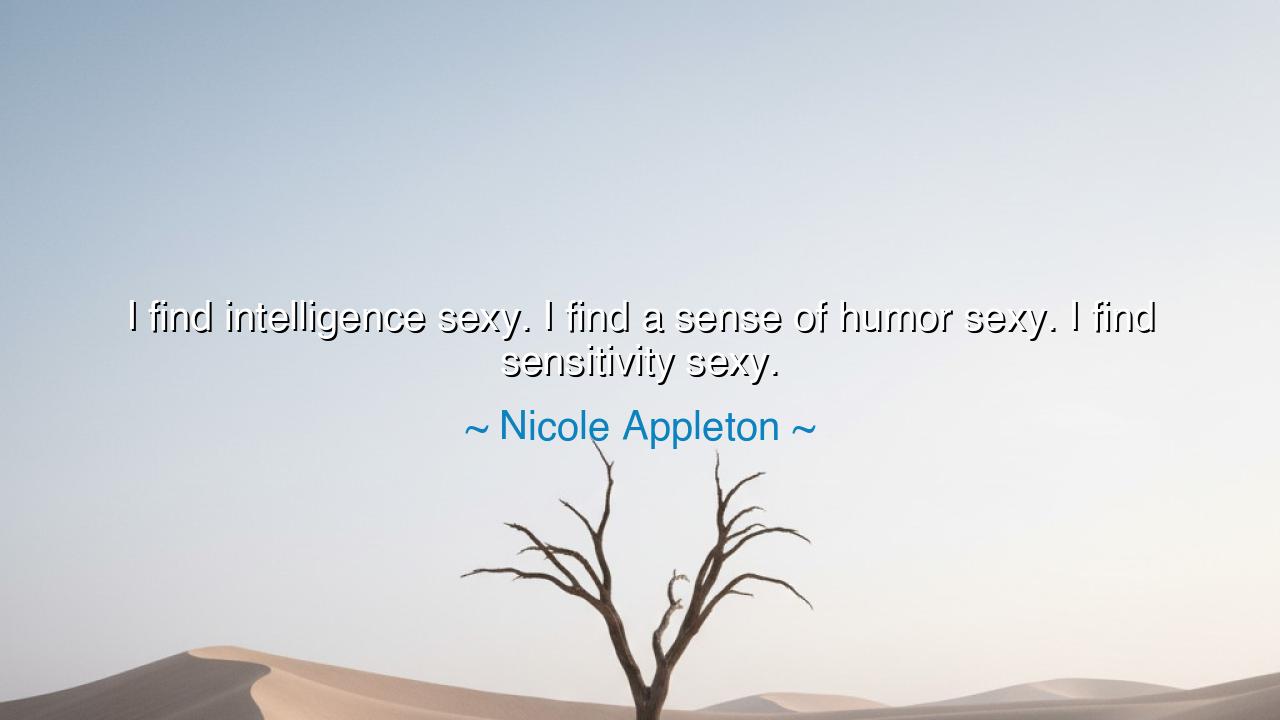
I find intelligence sexy. I find a sense of humor sexy. I find






When Nicole Appleton declared, “I find intelligence sexy. I find a sense of humor sexy. I find sensitivity sexy,” she spoke not merely of attraction, but of a higher kind of beauty—one that transcends flesh and face, one that speaks to the spirit rather than the senses. In her words shines an ancient truth: that true allure is not born of the body alone, but of the mind, the heart, and the soul in harmony. Her statement is simple, yet profound, for it reminds us that what draws one human to another at the deepest level is not perfection of form, but depth of being.
To the ancients, beauty was not merely a matter of appearance—it was the reflection of virtue and wisdom. The Greeks spoke of kalos kagathos, the ideal of being both beautiful and good, where the outer form was but a shadow of the inner light. Appleton’s quote carries the same essence into modern words. In a world obsessed with the surface, she calls attention to the sacred magnetism of intellect, the radiance of laughter, and the grace of compassion. These are not transient traits; they are the pillars of enduring connection. For time may fade the color of the eyes or the smoothness of the skin, but the spark of wit and the warmth of empathy—these never age.
When she says, “I find intelligence sexy,” she is honoring the mind as the source of enchantment. Intelligence here is not arrogance, but curiosity—the ability to see beyond what is, to question, to wonder, to create. It is the light behind the eyes that turns conversation into discovery and silence into thought. History is rich with such examples: think of Cleopatra, whose allure swayed empires not merely by her beauty, but by her wit and intellect. Julius Caesar and Mark Antony were drawn not to her face alone, but to her brilliance—her ability to converse with philosophers, to command languages, to match mind for mind. Her charm was not decoration—it was intelligence in motion, and that, Appleton reminds us, is the most irresistible force of all.
When she adds, “I find a sense of humor sexy,” she invokes another ancient wisdom—the power of joy. Humor is the sign of a soul that understands the dance of existence, that can find light in darkness and ease in difficulty. It is not mere jesting, but the courage to laugh in the face of chaos. The poet Rumi once wrote, “Sell your cleverness and buy bewilderment,” yet even he knew that laughter was the echo of divine play. A sense of humor bridges the chasms between hearts, dissolves tension, and reminds us that love need not always be solemn—it can be playful, alive, and free. The one who can laugh with you, not at you, is the one who truly sees you.
Then comes the most tender of her declarations: “I find sensitivity sexy.” In this, Appleton reveals the deepest layer of her meaning. Sensitivity is not weakness—it is strength refined by empathy. It is the ability to feel deeply, to notice the unseen, to honor the emotions of others without judgment. In a world that often mistakes indifference for power, sensitivity is a quiet rebellion—it is the soul refusing to grow numb. Consider Mahatma Gandhi, whose power lay not in might but in compassion; or Princess Diana, whose empathy touched millions. Their strength was born of feeling, not force. To be sensitive is to be awake to the world, and in that awakening lies profound beauty.
Appleton’s words, taken together, form a vision of love rooted not in possession, but in recognition. She speaks of desire as the meeting of minds, laughter as the joining of hearts, and empathy as the blending of souls. It is a reminder that attraction, in its purest form, is the soul’s acknowledgment of kindred spirit. When two people find each other in the realms of intellect, humor, and feeling, their bond is not fleeting—it becomes sacred. Such love does not burn out with passion’s first fire; it grows into something radiant and lasting, like embers that warm rather than scorch.
Let this, then, be the lesson for those who seek love or meaning in another: look beyond the body, and listen for the mind and heart. Seek the one who can challenge your thoughts, uplift your spirit, and understand your silence. Cultivate your own intelligence, nurture your own humor, and keep your heart open, for these are the qualities that not only attract others but also deepen your own soul. For as Nicole Appleton teaches us, beauty without depth fades quickly—but intelligence, laughter, and sensitivity are the eternal languages of the heart, spoken by the wise and heard by the true.
Thus, pass down this wisdom as the ancients once did: Do not love only with your eyes—love with your mind, your laughter, and your compassion. For the flesh may glow like dawn, but it is the spirit that endures like the sun. And when you find someone who mirrors your light in all three—thought, joy, and tenderness—you have found something rarer than beauty itself: you have found love that is alive.






AAdministratorAdministrator
Welcome, honored guests. Please leave a comment, we will respond soon